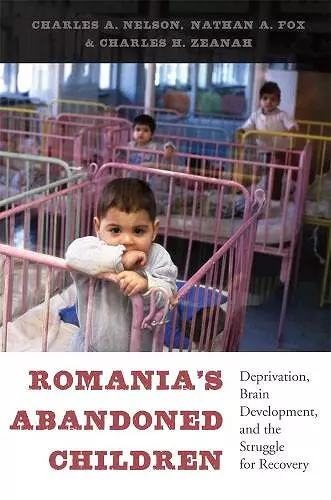Romania’s Abandoned Children
Deprivation, Brain Development, and the Struggle for Recovery
Charles A Nelson author Nathan A Fox author Charles H Zeanah author
Format:Hardback
Publisher:Harvard University Press
Published:6th Jan '14
Currently unavailable, and unfortunately no date known when it will be back

The implications of early experience for children’s brain development, behavior, and psychological functioning have long absorbed caregivers, researchers, and clinicians. The 1989 fall of Romania’s Ceausescu regime left approximately 170,000 children in 700 overcrowded, impoverished institutions across Romania, and prompted the most comprehensive study to date on the effects of institutionalization on children’s wellbeing. Romania’s Abandoned Children, the authoritative account of this landmark study, documents the devastating toll paid by children who are deprived of responsive care, social interaction, stimulation, and psychological comfort.
Launched in 2000, the Bucharest Early Intervention Project (BEIP) was a rigorously controlled investigation of foster care as an alternative to institutionalization. Researchers included 136 abandoned infants and toddlers in the study and randomly assigned half of them to foster care created specifically for the project. The other half stayed in Romanian institutions, where conditions remained substandard. Over a twelve-year span, both groups were assessed for physical growth, cognitive functioning, brain development, and social behavior. Data from a third group of children raised by their birth families were collected for comparison.
The study found that the institutionalized children were severely impaired in IQ and manifested a variety of social and emotional disorders, as well as changes in brain development. However, the earlier an institutionalized child was placed into foster care, the better the recovery. Combining scientific, historical, and personal narratives in a gripping, often heartbreaking, account, Romania’s Abandoned Children highlights the urgency of efforts to help the millions of parentless children living in institutions throughout the world.
For those interested in Romania or the region, the book offers an incisive and disturbing portrait of the benighted policies pursued in [the treatment of abandoned children]—and not only by Romania. The book also contains an excellent discussion of the controversies surrounding the issue of international adoption in the Romanian context, which should also prompt thought among those focused on the parallel Russian case. -- Robert Levgold * Foreign Affairs *
Romania’s Abandoned Children…describes the stark disadvantages faced by institutionalized children, whose cognitive development is likely to be irreversibly stunted if they stay in orphanages past age 2. -- Tara Bahrampour * Washington Post *
The publication of this book could help to spur efforts to offer foster care and adoption in Romania and in other countries as well. -- Mary K. Rothbart and Michael I. Posner * Times Higher Education *
This book tackles one of the most fundamental questions about human development: how do our early experiences shape our brain, body, and character? This is a landmark study of child development. -- Avshalom Caspi, Duke University
When thousands of infants were abandoned, to be raised in large and impersonal institutions, a group of scientists took on the task of understanding how deprivation impacts the psychological, cognitive, and neurological development of very young children. This is a fascinating story with important social, cultural, and policy implications. -- Joan Stiles, University of California, San Diego
ISBN: 9780674724709
Dimensions: unknown
Weight: unknown
416 pages